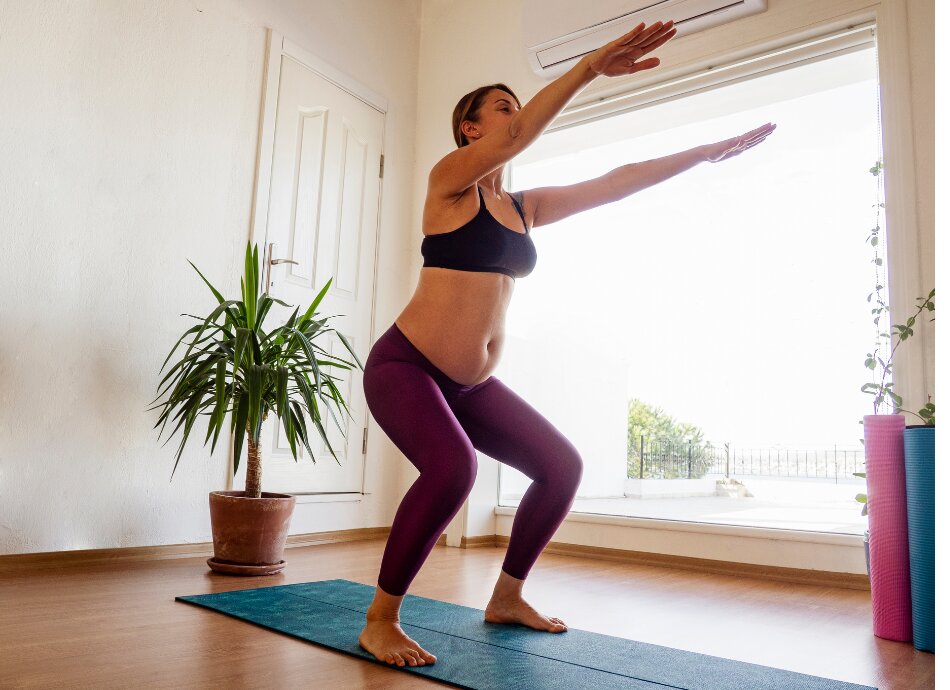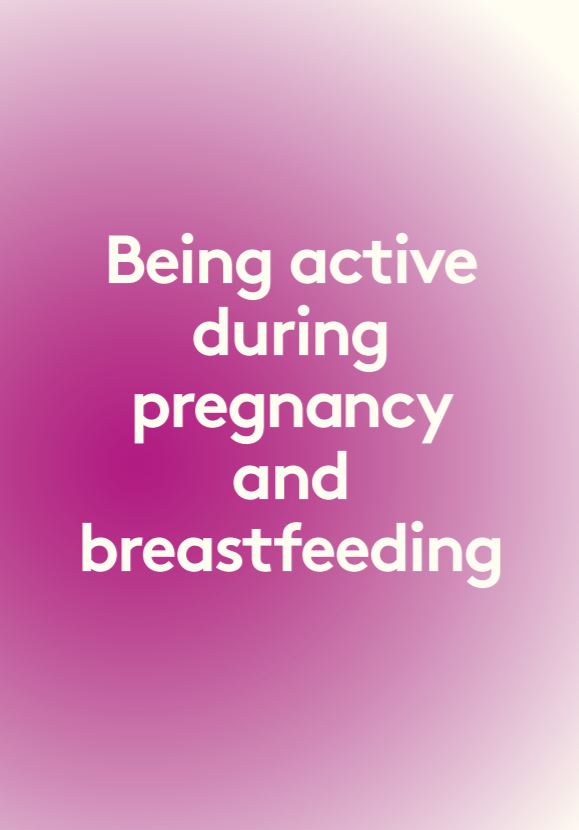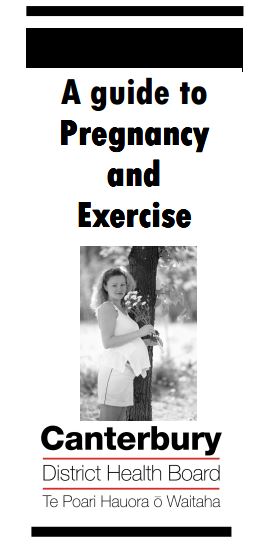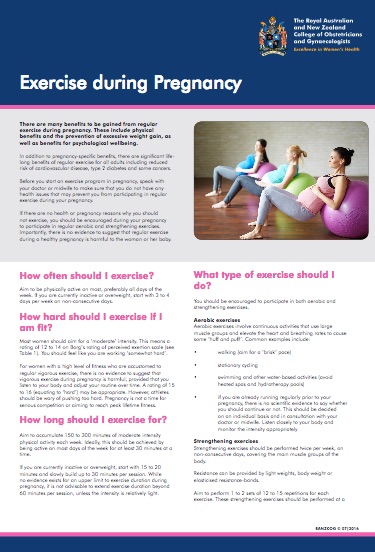You can now add Healthify as a preferred source on Google. Click here to see us when you search Google.
Pregnancy and physical activity
Exercise while you are pregnant/hapū
Key points about exercise when pregnant/hapū
- Regular exercise during pregnancy can help you cope with the physical changes your body goes through when you become pregnant.
- It also builds your strength for the labour and birth.
- You should not start new sports or strenuous exercise during pregnancy.
- If you have any serious pre-existing health conditions, talk to your doctor or midwife before starting a physical activity.
- Listen to your body, and slow down and rest when you need to.

Being physically active is one of the most important things you can do for your health. This is still the case when you are pregnant/hapū. There is plenty of evidence that regular physical activity is good for you.
Some of the health benefits of exercise include:
- controlling your weight
- preventing health conditions, such as diabetes
- improving mood
- boosting energy
- promoting better sleep
- putting the spark back into your sex life
- having fun.
You should still be able to exercise when pregnant/hapū. In fact, moderate aerobic and muscle-strengthening activities are considered safe and are encouraged as long as you don’t have some underlying health conditions. Not only does regular exercise help you cope with the changes that your body goes through when you become hapū/pregnant, it increases the likelihood of giving birth to a healthy baby and can speed up your recovery after birth.
Benefits of physical activity and exercise in pregnancy include:
- improving heart and lung strength and stamina, which can help you cope with labour
- building muscular strength to help you carry your baby
- improving your posture and reducing backache
- improving blood circulation and reduce the risk of varicose veins
- boosting your mood
- enhancing your recovery after birth.
Physical activity or exercise during pregnancy can reduce the risk of:
- gaining too much weight
- a long labour
- the need for pain relief, caesarean section or instrumental delivery during labour
- leg cramps
- pre-eclampsia or high blood pressure
- pregnancy-induced high blood pressure
- gestational diabetes
- urinary incontinence
- constipation.
Exercise in pregnancy is recommended but there are some safety considerations. Remember that exercise does not need to be strenuous to be good for you. If you were not active before you got pregnant, you should not suddenly take up intense exercise. You may need to slow down as your pregnancy progresses.
The changes your body is going through can also make certain positions and activities risky for you and your baby. While exercising, try to avoid activities that involve jumping, jarring motions or quick changes in direction that may strain your joints and cause injury.
Do not lie flat on your back for long periods of time after 20 weeks (5 months) of pregnancy. This is because the weight of your puku/pregnancy presses on the main blood vessel bringing blood back to your heart and this can make you feel faint.
There is a higher risk of strains during pregnancy because the hormones released to loosen your joints and ligaments in preparation for the birth can make your joints less stable.
You should avoid sports where there is a risk of any trauma or injury to your puku, such as kick-boxing or judo. Falls can also cause injury to your pregnancy, and as your puku gets bigger your balance may not be as good. Be cautious with activities such as horse riding and mountain biking, particularly later in pregnancy. You should not scuba dive or do high altitude sports while you are pregnant.
It is easier to become overheated while you are pregnant. If the weather is hot, try exercising in the early morning or evening when it is cooler. Drink plenty of water to stay hydrated.
A few safety tips:
- Don't exercise to the point of exhaustion.
- Don't exercise in extremely hot conditions.
- Avoid contact sports.
- In late pregnancy, avoid exercise lying on your back.
| Stop exercising and contact your doctor or midwife if you notice: |
|
Although moderate physical activity or exercise is recommended during pregnancy, you should not start new strenuous exercises while you are pregnant.
Some people need to take extra care when exercising while pregnant/hapū. It’s a good idea to talk to your doctor or midwife first before you start any exercise during pregnancy if you:
- have any concerns or fears
- have heart disease, obesity or diabetes
- have cervical incompetence or a history of preterm labour
- are expecting twins
- have any serious pre-existing health conditions
- are thinking of increasing the duration or intensity of your activity
- are thinking of starting new activities.
Your doctor or midwife can advise on appropriate activities or exercises for you.
If you have any of the following health conditions, you should not do physical activity or exercise while you are pregnant until you have discussed it with your doctor or midwife:
- significant heart disease
- a history of preterm labour or cervical incompetence
- a growth restricted baby in this pregnancy
- high blood pressure
- bleeding after 24 weeks gestation
- a placenta praevia
- ruptured membranes
- poorly controlled type 1 diabetes
- significant lung disease
- poorly controlled epilepsy.
Exercise during pregnancy is most practical during the first 24 weeks. During the last 3 months, it’s normal to find that exercise that once seemed easy has become challenging.
If you don’t normally exercise regularly, you need to start gently and increase your activity gradually. Begin with only a few minutes and monitor yourself to see how you are feeling. If you are comfortable, increase slowly, week by week, until you can stay active for the recommended 30 minutes a day.
Some exercises you can do during pregnancy include:
- pelvic floor exercises
- walking
- low-impact aerobics or yoga
- swimming or aqua jogging.
It is recommended that you do pelvic floor exercises before, during and after pregnancy as this helps strengthen your pelvic floor muscles. This may help stop them from becoming weakened during pregnancy and childbirth, and reduce the risk of incontinence and pelvic organ prolapse. Once you've learned them, try doing 10 repeat exercises, 6 times a day. They can become part of your daily routine.
Walking is a great activity – one benefit of being a walker is that it is easy to continue once your baby is born. Most babies enjoy being walked in a stroller or backpack and you may find it is a good way to keep you both happy. Walking also helps to ease aching legs and a sore back. Take it slowly and rest as often as you need. Gentle walking in early labour can also help encourage the progression of labour.
Low-impact aerobics or yoga can also be a great option. As well as providing a gentle workout, yoga teaches you how to control your breathing – a useful tool for coping with labour. Avoid excessive stretches or positions as your ligaments are softened due to hormones produced in pregnancy. Talk with your yoga instructor about what is safe while pregnant.
You might like to try swimming or aqua jogging. The water will support your increased weight and you don’t risk hurting your joints.
Always begin each exercise session with up to 10 minutes of warm-up activity and stretch gently to prepare your muscles. And it’s just as important to cool down after working out by gently reducing your activity and heart rate.
In some areas of Aotearoa New Zealand, there are special pregnancy exercise classes (check out your local community centre, fitness centre, swimming pool or women's centre for details). If there are no classes near you, a trained fitness instructor (with qualifications in either physiotherapy or physical education) can work with you to develop a series of exercises that you can do safely when you are pregnant/hapū. Some pools have dedicated sessions for pregnant people.
Exercise can be as simple as going for a walk with your partner or friends. Not only is this free, it is a good opportunity to catch up with friends and whānau.
Everyone is different with the exercise they can and can't do, and how long they can do it for. If you find doing an exercise tiring and uncomfortable, you may need to change the activity. You may also need to change your physical activity level as your pregnancy progresses. This is because as your baby grows and your weight redistributes, your physical ability changes. Some exercises that seem easy during early pregnancy may not be the same during late pregnancy. Listen to your body, slow down and rest when you need to.
The following links provide further information about physical activity and pregnancy. Be aware that websites from other countries may have information that differs from New Zealand recommendations.
Being active during pregnancy(external link) Health New Zealand | Te Whatu Orav
Being active during pregnancy and breastfeeding(external link) Healthy Kids, NZ
Diet and exercise(external link) National Women's Health, Auckland DHB, NZ
A guide to pregnancy and exercise(external link) Canterbury District Health Board, NZ, 2011
Exercise during pregnancy(external link) Royal Australian and New Zealand College of Obstetricians and Gynaecologists, 2016
Apps
Reference
- Eating and activity guidelines for New Zealand adults(external link) Ministry of Health, NZ, 2020
Brochures

Healthy Kids, NZ, 2019

Canterbury District Health Board, NZ, 2011

Royal Australian and New Zealand College of Obstetricians and Gynaecologists, 2016
Credits: Healthify Editorial Team. Healthify is brought to you by Health Navigator Charitable Trust.
Reviewed by: Dr Judy Ormandy, Obstetrician and Gynaecologist, Capital & Coast District Health Board
Last reviewed:
Page last updated:





